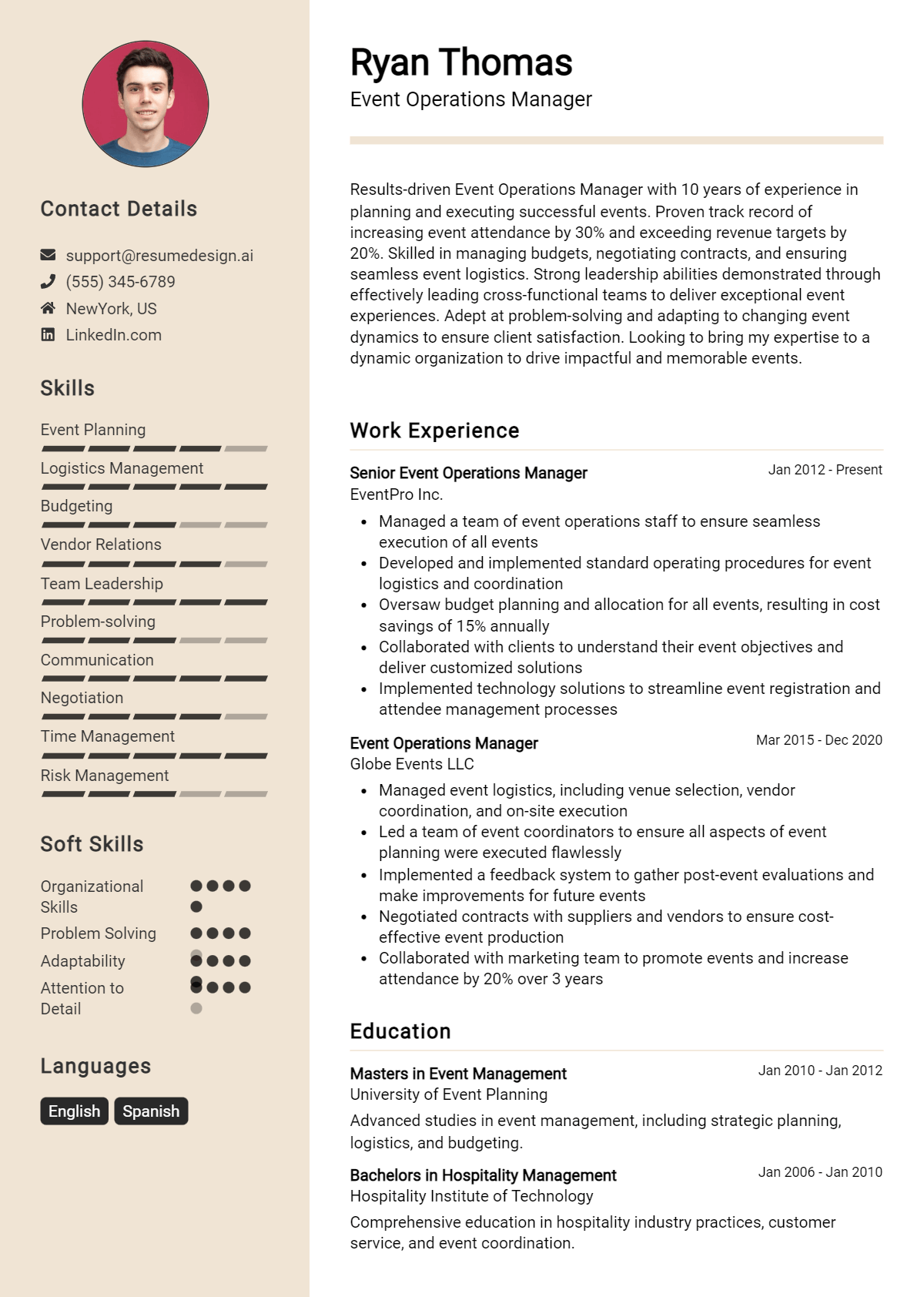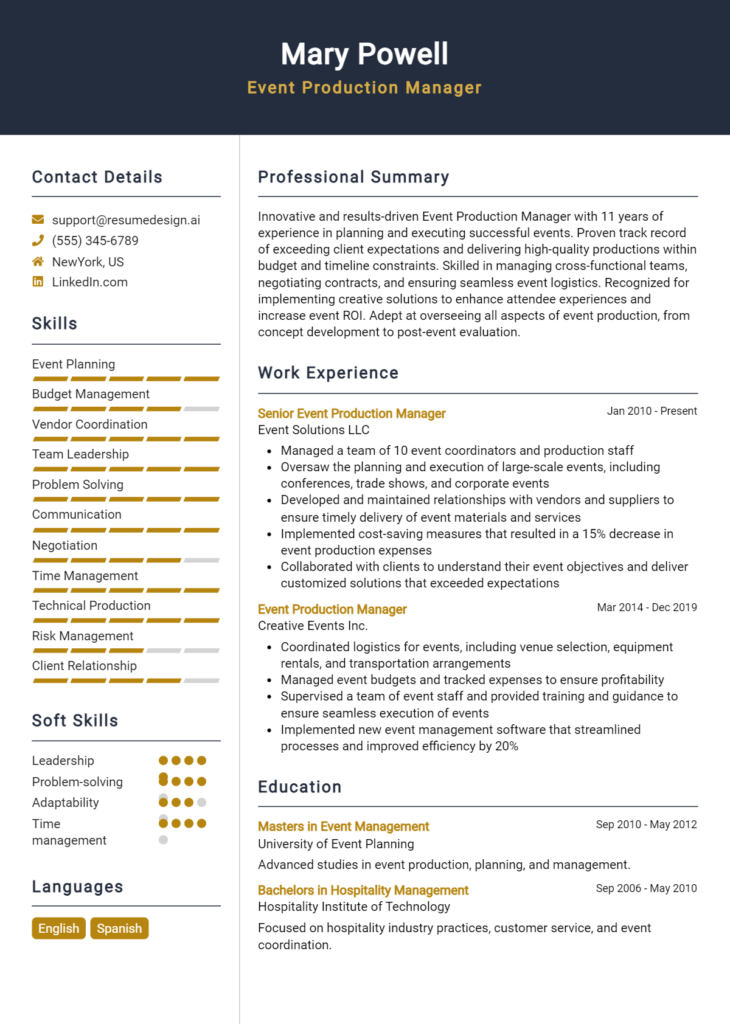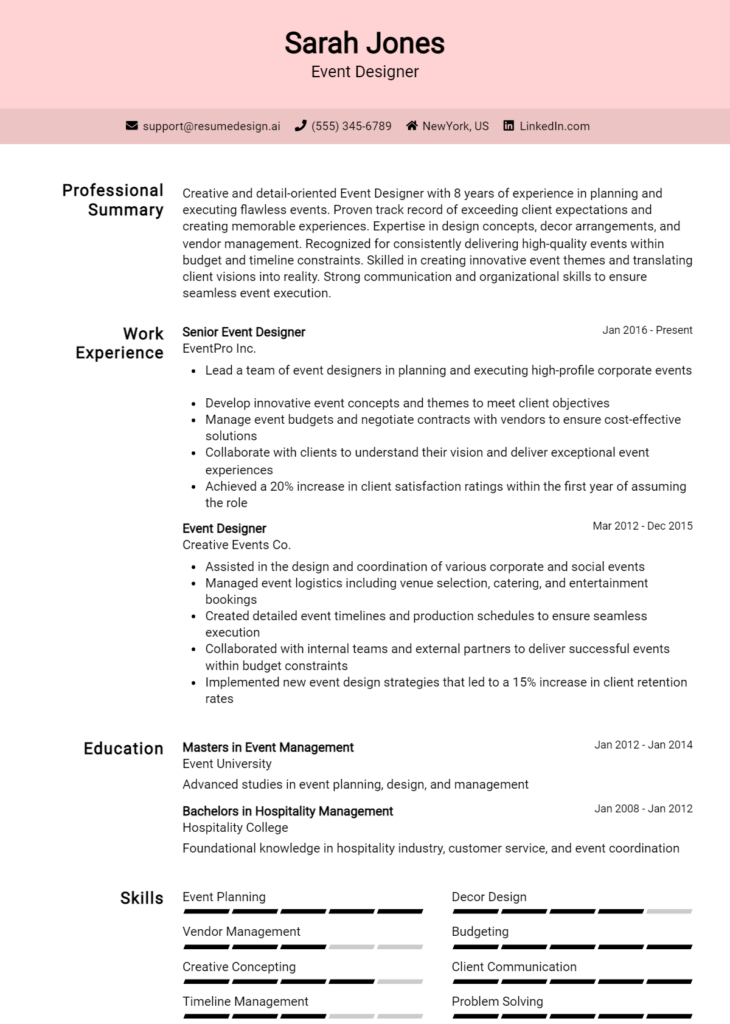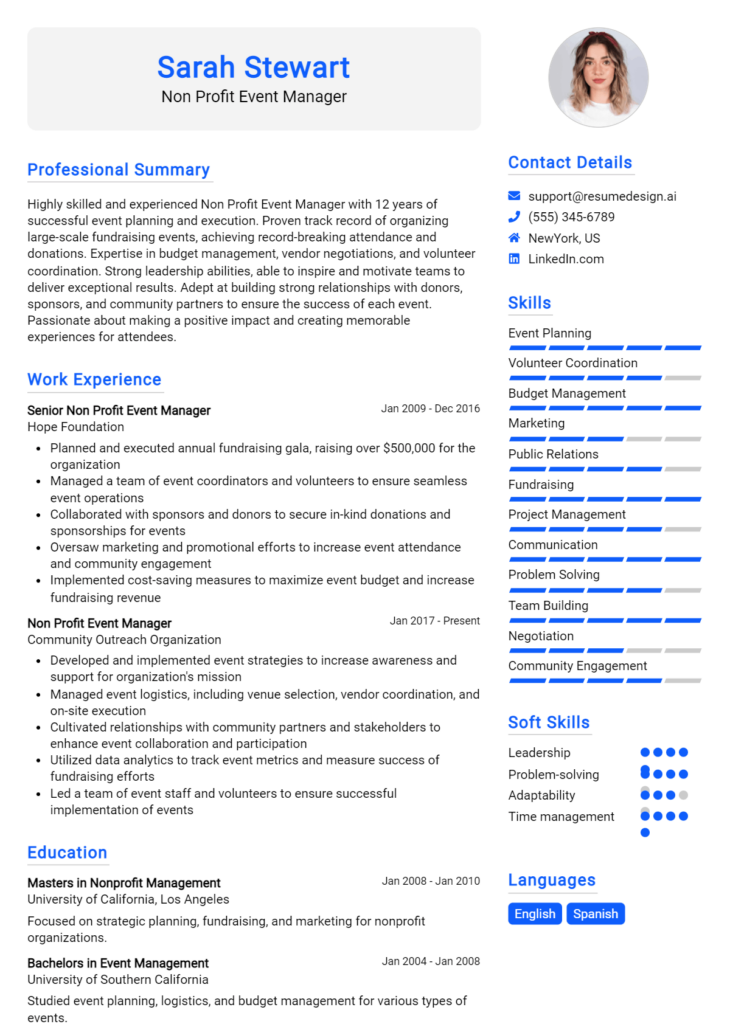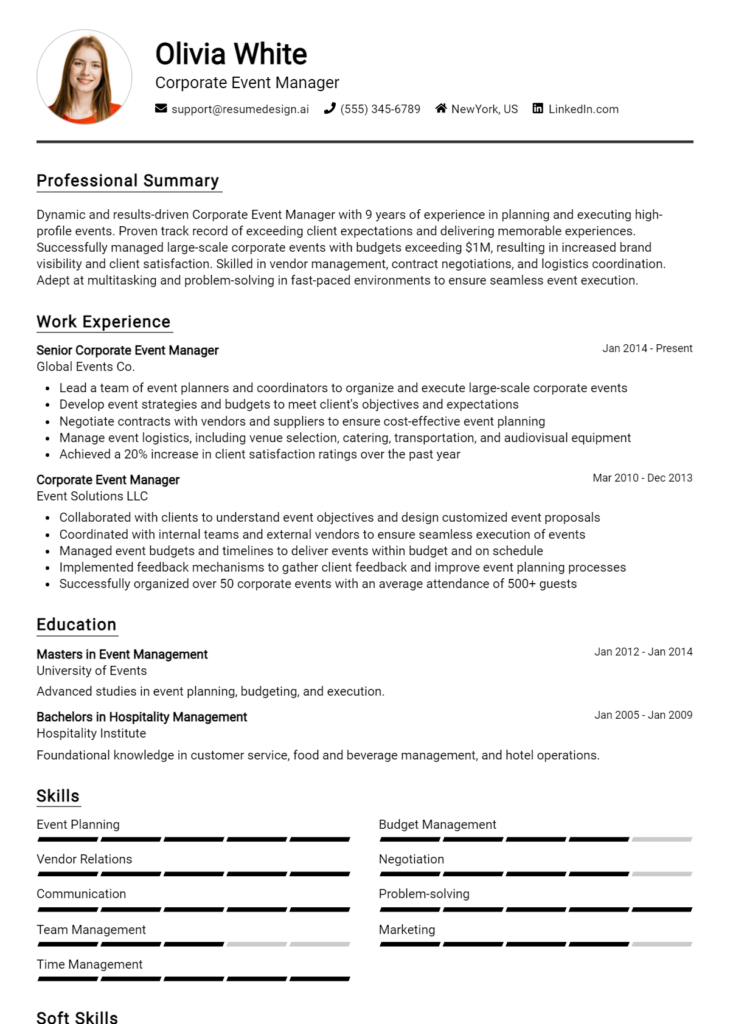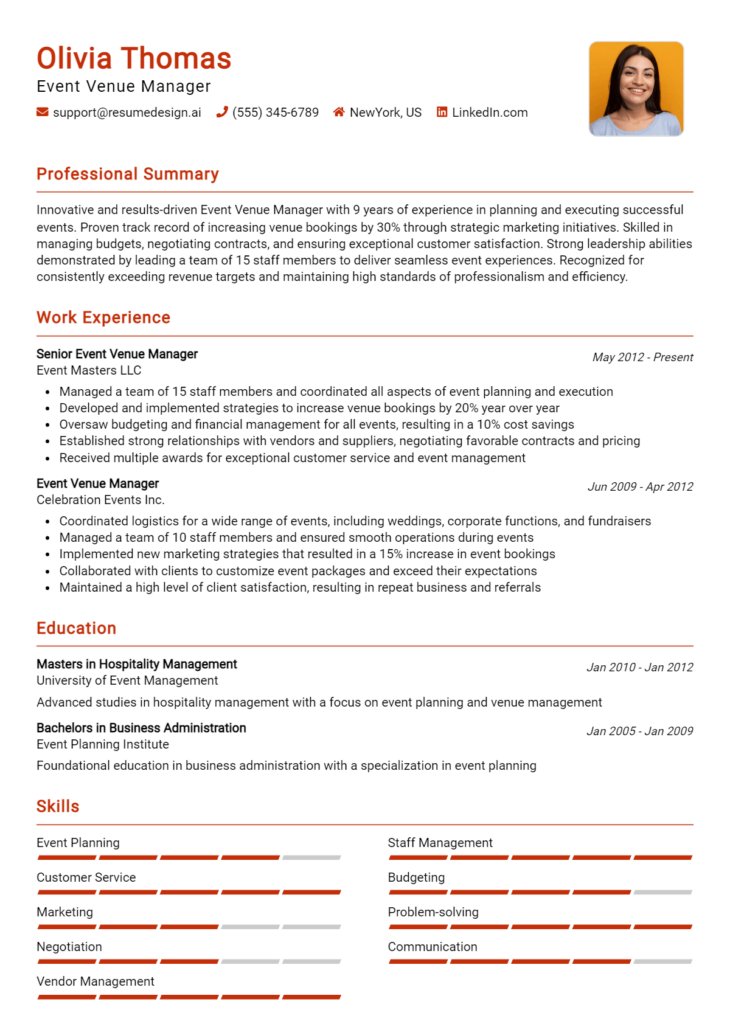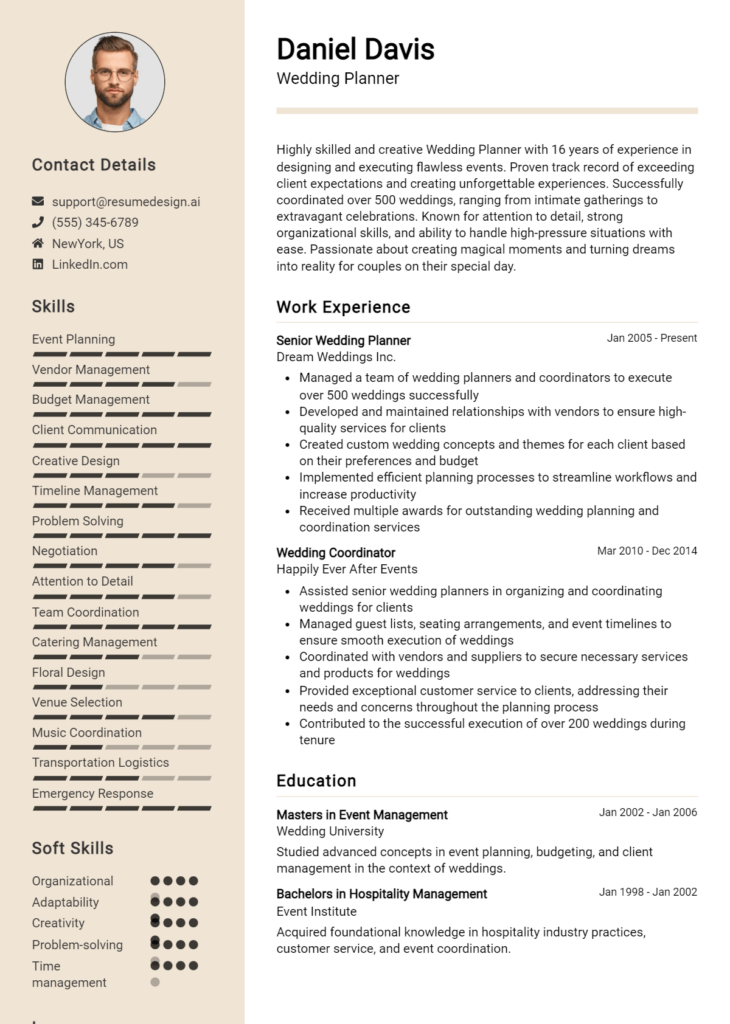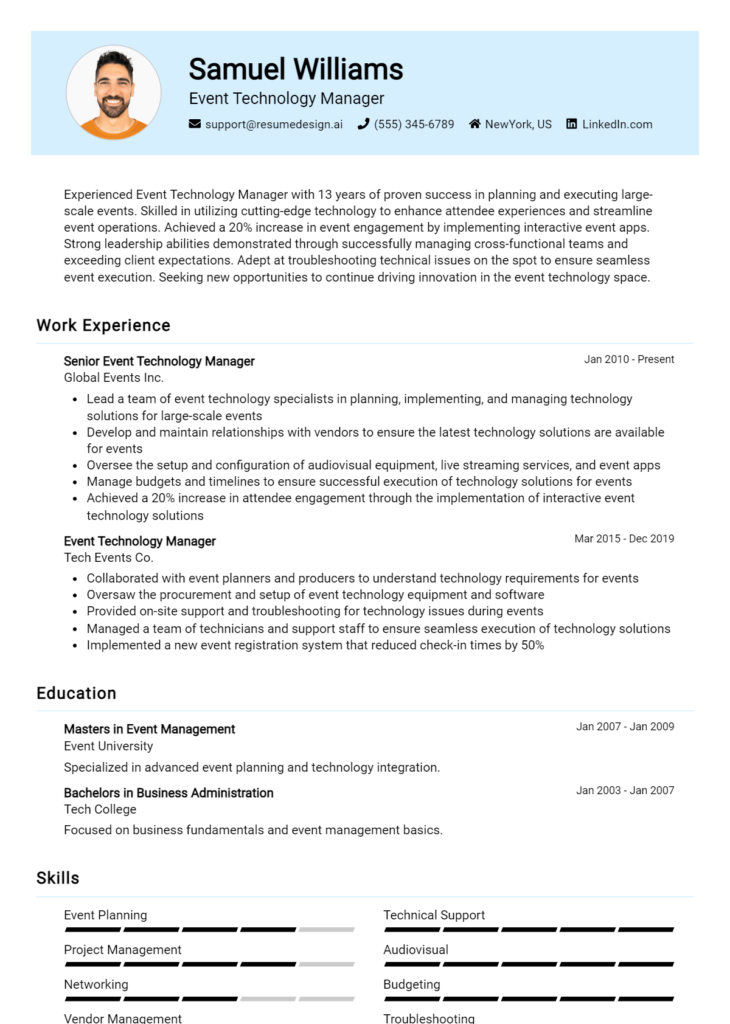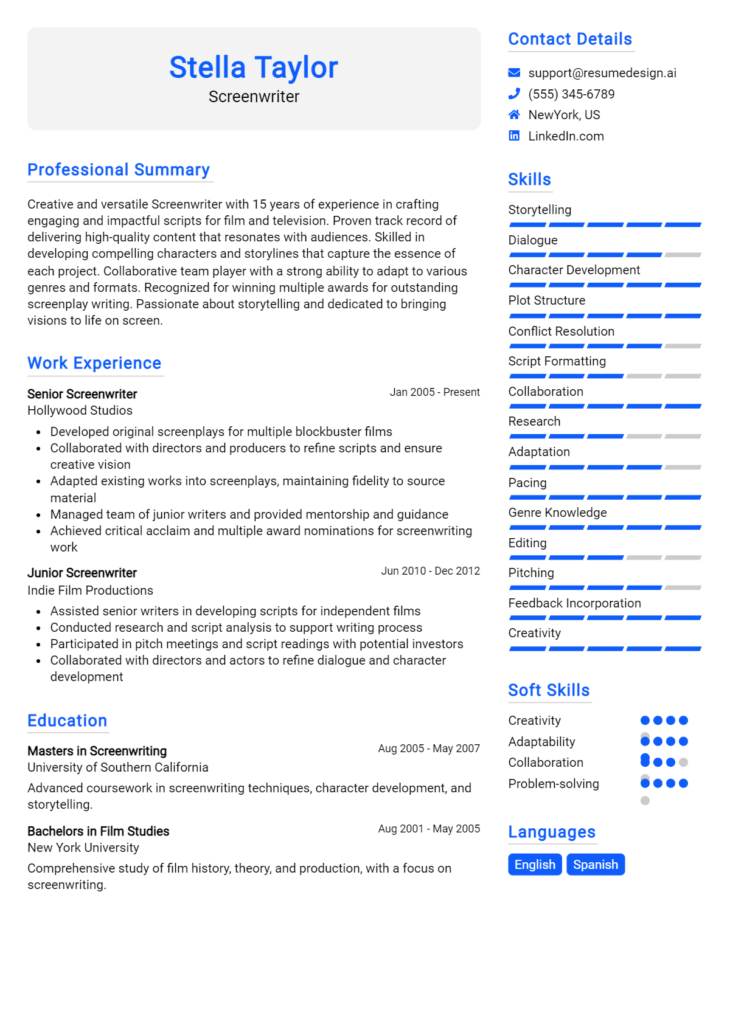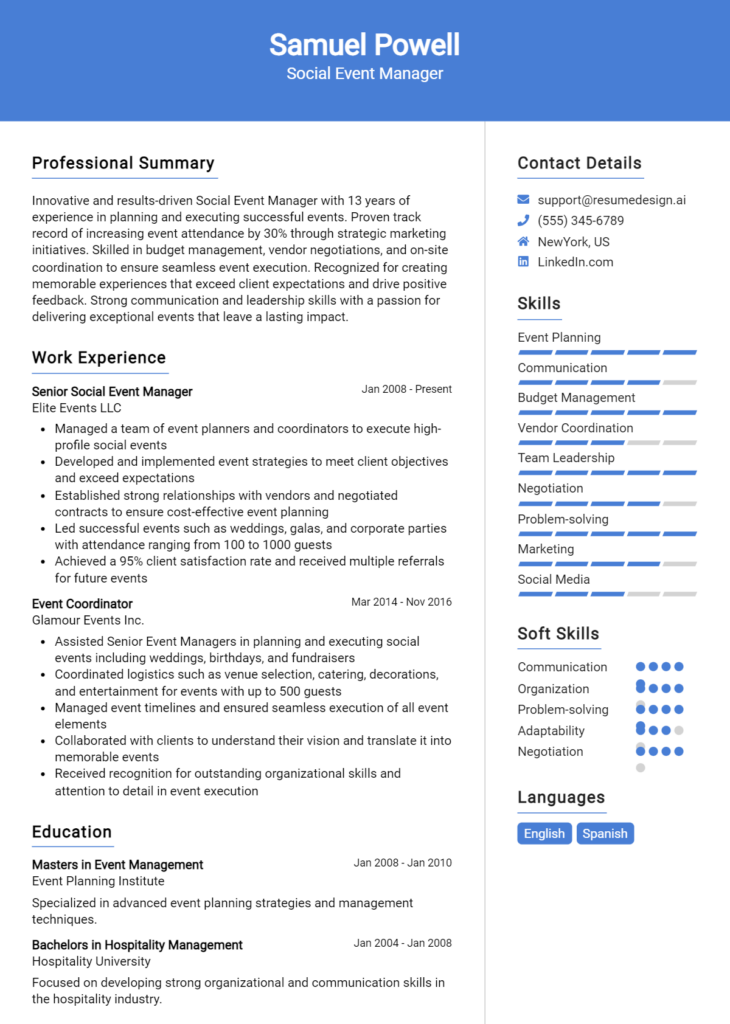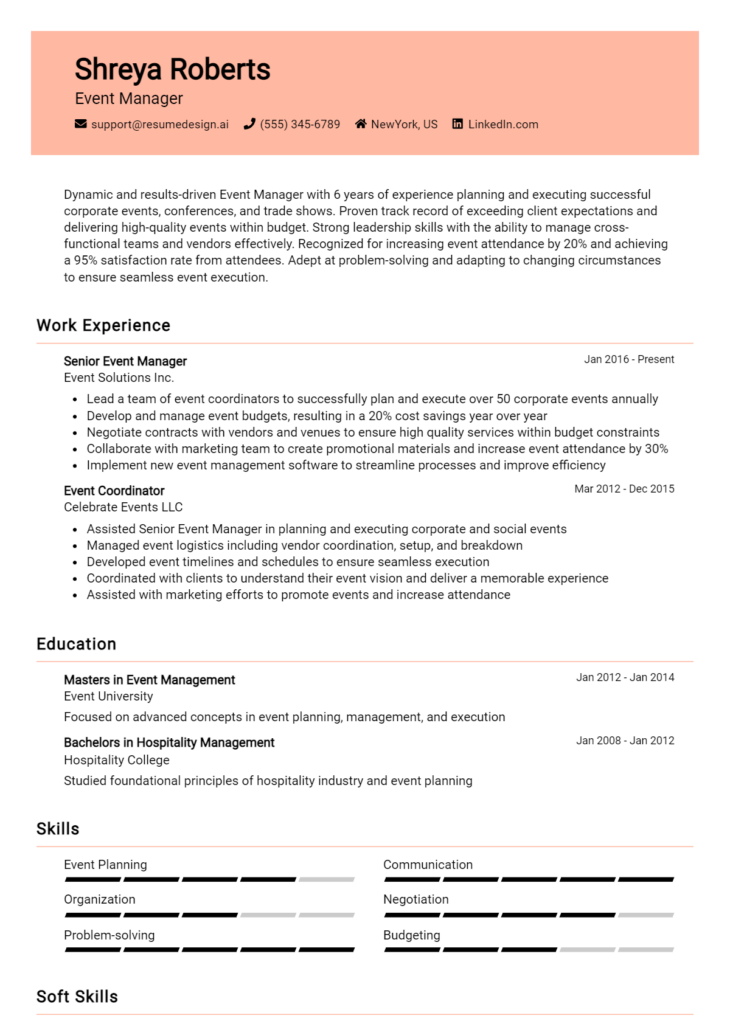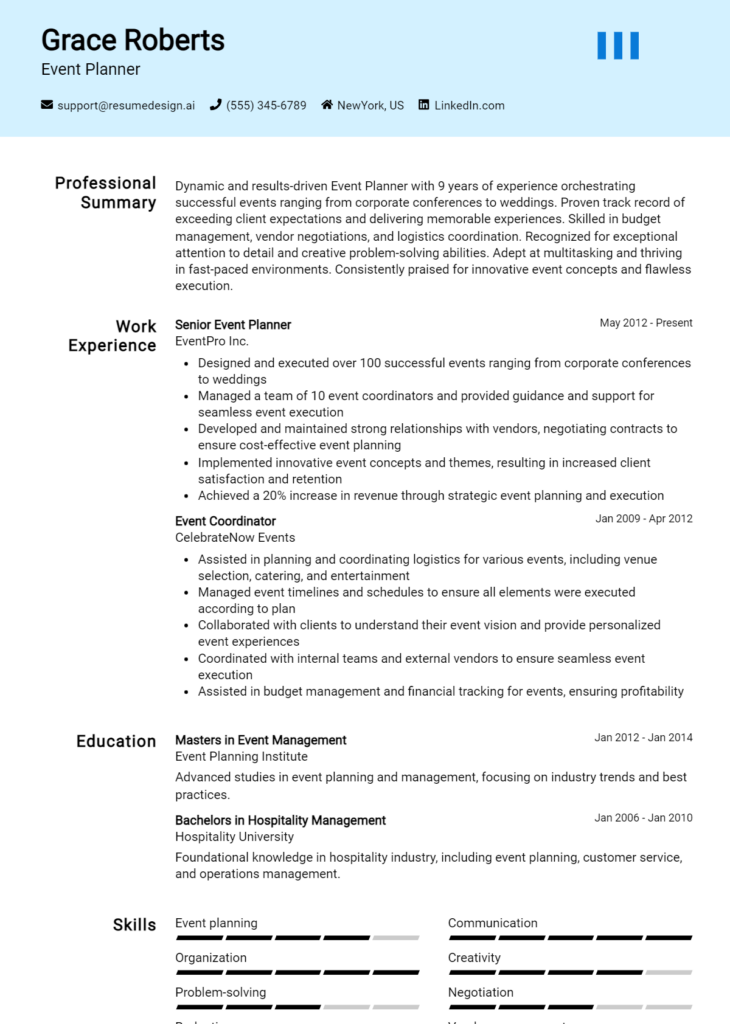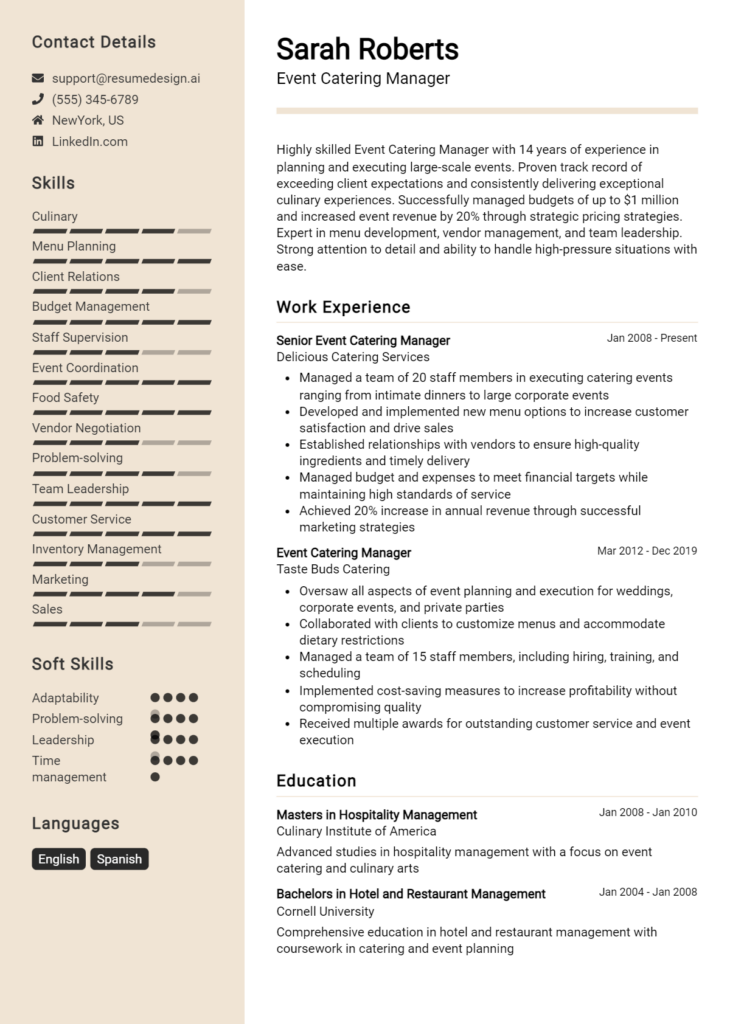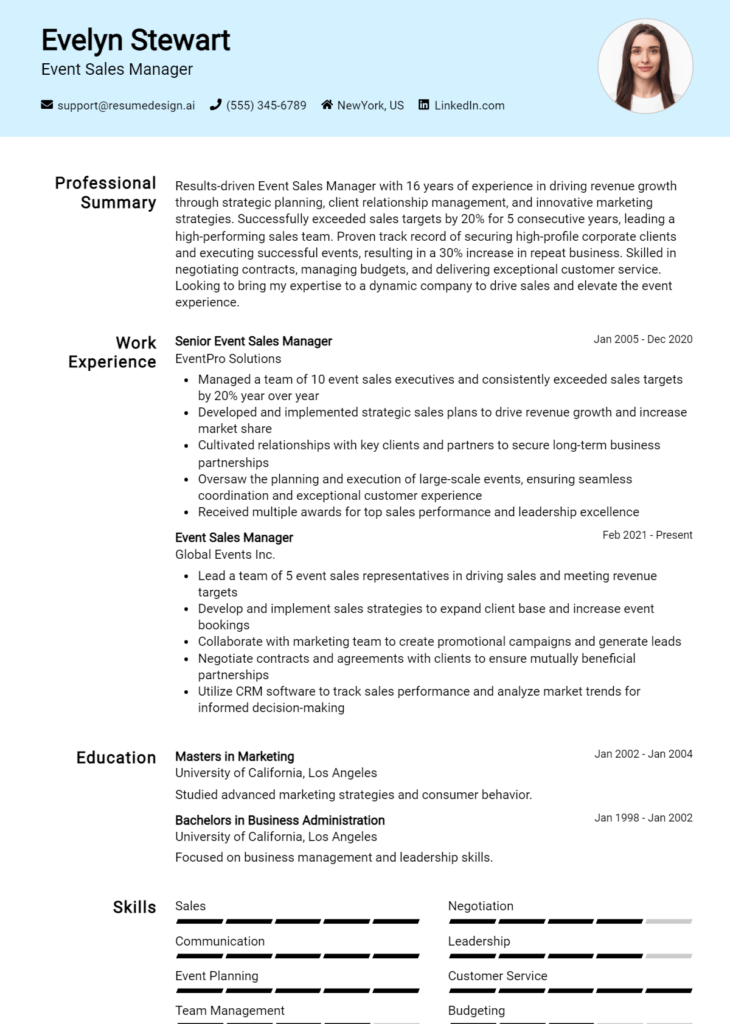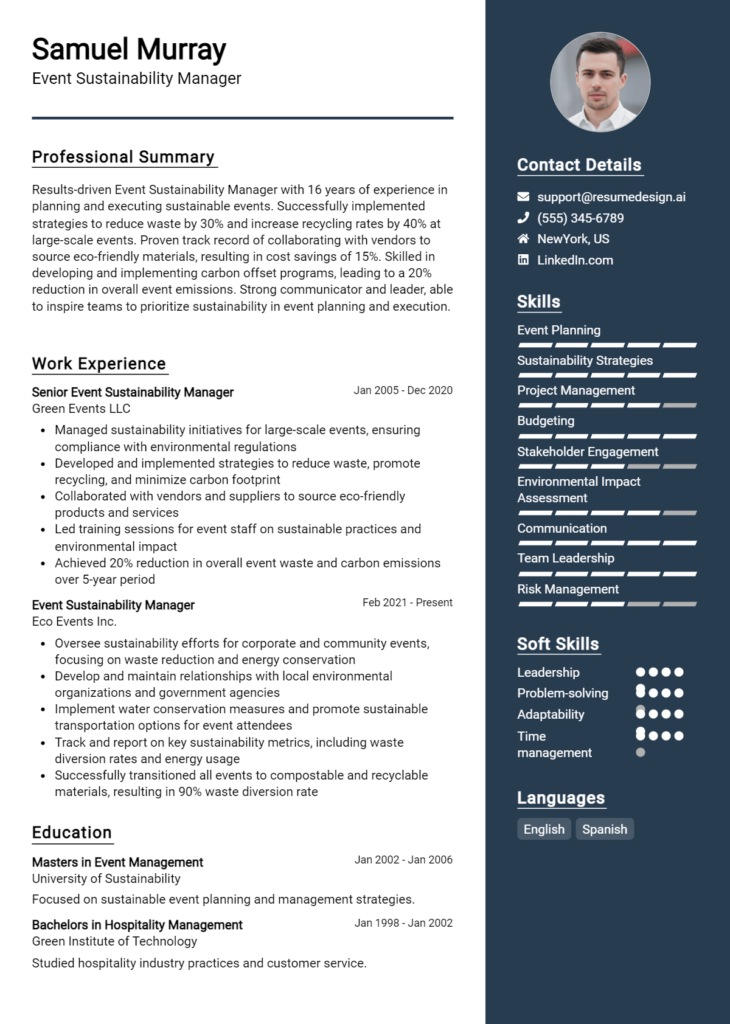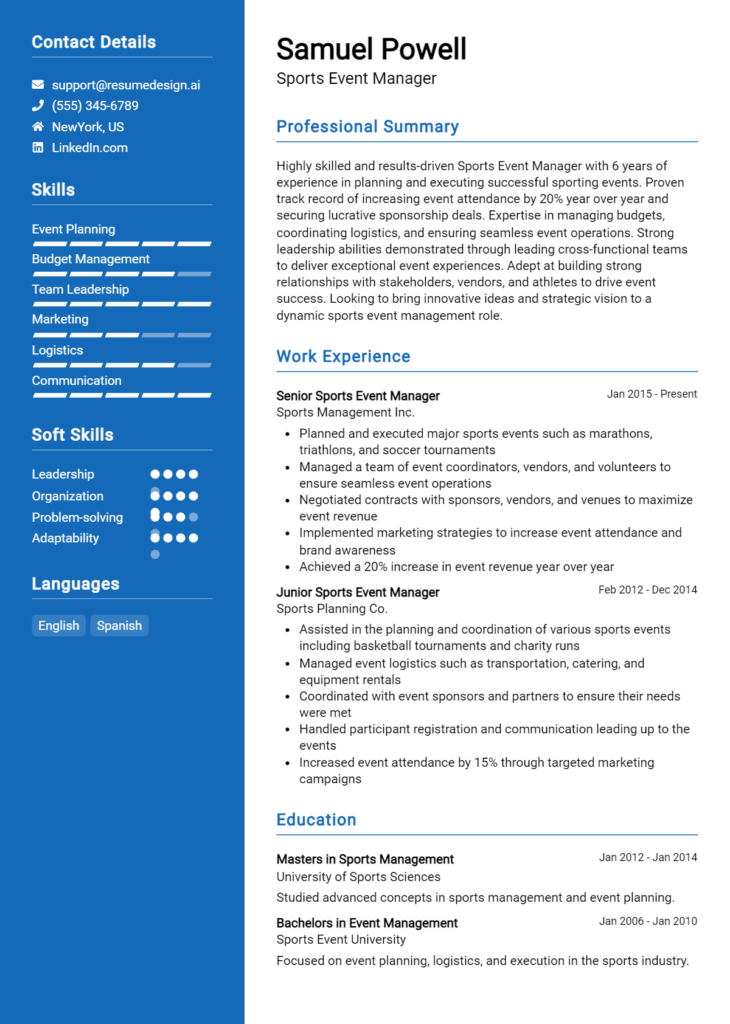Event Operations Manager Core Responsibilities
The Event Operations Manager plays a crucial role in coordinating various departments to ensure seamless event execution. Key responsibilities include logistical planning, vendor management, budget oversight, and on-site coordination. Essential skills encompass technical proficiency, operational efficiency, and strong problem-solving abilities, enabling the manager to address challenges swiftly. These competencies not only contribute to the success of individual events but also align with the organization's broader objectives. A well-structured resume can effectively highlight these qualifications, showcasing the candidate's potential impact.
Common Responsibilities Listed on Event Operations Manager Resume
- Developing and managing event budgets and timelines
- Coordinating with vendors and suppliers for event services
- Overseeing event logistics, including venue selection and setup
- Ensuring compliance with safety and legal regulations
- Collaborating with marketing teams for promotional activities
- Managing on-site staff and volunteers during events
- Conducting post-event evaluations to assess outcomes
- Implementing technology solutions for event management
- Building and maintaining relationships with stakeholders
- Creating detailed event plans and checklists
- Resolving on-the-spot issues to ensure smooth operations
- Reporting on event performance and budget adherence
High-Level Resume Tips for Event Operations Manager Professionals
In the competitive landscape of event management, a well-crafted resume is crucial for professionals seeking to make their mark as Event Operations Managers. This document often serves as the first impression a candidate leaves on a potential employer, making it essential that it not only highlights relevant skills but also effectively showcases noteworthy achievements. A strong resume can set the tone for the entire hiring process, capturing the attention of recruiters and demonstrating a candidate’s suitability for the role. This guide will provide practical and actionable resume tips specifically tailored for Event Operations Manager professionals, helping them to stand out in a crowded field.
Top Resume Tips for Event Operations Manager Professionals
- Tailor your resume to each job description by incorporating relevant keywords and phrases that align with the specific requirements of the role.
- Highlight your experience in managing various types of events, such as corporate meetings, conferences, weddings, or festivals, to showcase your versatility.
- Quantify your achievements with specific metrics, such as the number of events managed, budget sizes, or attendee satisfaction ratings, to demonstrate your impact.
- Emphasize your coordination skills by detailing how you successfully managed logistics, vendor relationships, and on-site execution.
- Incorporate industry-specific skills such as budget management, contract negotiation, and risk assessment to highlight your expertise.
- Showcase your proficiency in event management software and tools that are commonly used in the industry, such as Cvent or Eventbrite.
- Include any certifications or training relevant to event management, such as Certified Meeting Professional (CMP) or Event Planning certifications.
- Highlight your ability to work under pressure and adapt to changing circumstances, which is crucial in the fast-paced world of event planning.
- Incorporate strong action verbs in your bullet points to convey a sense of proactivity and leadership.
- Keep your resume concise and focused, ideally no longer than one page, while ensuring that all relevant information is clearly presented.
By implementing these tips, Event Operations Manager professionals can significantly enhance their resumes, making them more appealing to potential employers. A well-structured and targeted resume not only highlights qualifications and accomplishments but also conveys a candidate's dedication to the field, ultimately increasing their chances of securing a position in this dynamic industry.
Why Resume Headlines & Titles are Important for Event Operations Manager
In the competitive field of event management, a resume serves as a critical tool for showcasing a candidate's ability to execute flawless events. A well-crafted resume headline or title is essential for an Event Operations Manager, as it provides a snapshot of the candidate's qualifications at a glance. A strong headline can immediately capture the attention of hiring managers by summarizing core competencies and unique selling points in an impactful phrase. It should be concise, relevant, and directly aligned with the job description, setting the stage for the rest of the resume and influencing the hiring decision.
Best Practices for Crafting Resume Headlines for Event Operations Manager
- Keep it concise: Aim for a headline that is no longer than 10 words.
- Be role-specific: Tailor your headline to reflect the specific position you are applying for.
- Highlight key skills: Incorporate essential skills relevant to event operations management.
- Use action words: Start with strong verbs to convey your expertise and dynamism.
- Quantify achievements: Where possible, include numerical indicators of success (e.g., “Managed 50+ events annually”).
- Showcase unique value: Differentiate yourself by mentioning any special qualifications or experiences.
- Stay professional: Maintain a formal tone that aligns with industry standards.
- Avoid clichés: Steer clear of vague terms like “hardworking” or “motivated” that don’t add value.
Example Resume Headlines for Event Operations Manager
Strong Resume Headlines
"Dynamic Event Operations Manager with 8+ Years in High-Profile Corporate Events"
“Award-Winning Planner Specializing in Large-Scale Fundraising Events”
“Results-Driven Event Manager with Proven Track Record of Increasing Attendance by 30%”
“Strategic Event Operations Leader Excelling in Budget Management and Vendor Relations”
Weak Resume Headlines
“Event Manager Seeking Opportunities”
“Professional with Event Experience”
Strong headlines are effective because they immediately communicate specific qualifications, skills, and achievements that align with the job requirements, thereby piquing the interest of hiring managers. In contrast, weak headlines lack clarity and specificity, often failing to convey the candidate’s unique strengths or relevance to the role. This can result in a missed opportunity, as generic titles blend in with many others and do not stand out in a competitive job market.
Writing an Exceptional Event Operations Manager Resume Summary
A well-crafted resume summary is crucial for an Event Operations Manager as it serves as the first impression to hiring managers. A strong summary succinctly encapsulates your key skills, relevant experience, and notable accomplishments, allowing you to quickly capture the attention of potential employers. It should be concise and impactful, tailored to the specific job you are applying for, and designed to highlight your unique qualifications that align with the demands of the role. By effectively summarizing your expertise, you increase your chances of standing out in a competitive job market.
Best Practices for Writing a Event Operations Manager Resume Summary
- Quantify Achievements: Use numbers and statistics to demonstrate your impact in previous roles.
- Focus on Relevant Skills: Highlight skills that are specifically mentioned in the job description.
- Tailor for the Job: Customize your summary for each position to reflect the specific requirements and culture of the organization.
- Be Concise: Keep your summary brief, ideally between 3-5 sentences, to maintain the reader's attention.
- Use Strong Action Verbs: Start sentences with powerful verbs to convey confidence and capability.
- Showcase Leadership: Emphasize your ability to lead teams and manage logistics effectively.
- Include Industry Keywords: Incorporate relevant terms and phrases from the event management industry to pass through Applicant Tracking Systems.
- Highlight Soft Skills: Don’t forget to mention interpersonal skills, as they are crucial in managing events and teams.
Example Event Operations Manager Resume Summaries
Strong Resume Summaries
Dynamic Event Operations Manager with over 8 years of experience coordinating high-profile events for Fortune 500 companies, resulting in a 20% increase in client satisfaction scores. Proven ability to manage budgets exceeding $500,000 while achieving excellence in logistics and vendor relations.
Detail-oriented professional with a track record of successfully executing over 50 large-scale corporate events annually, enhancing attendee engagement by 30%. Skilled in team leadership and strategic planning, ensuring seamless operations from conception to execution.
Results-driven Event Operations Manager with extensive experience in venue management and event production. Increased operational efficiency by 25% through the implementation of streamlined processes and effective team training.
Weak Resume Summaries
Experienced in event management and planning. I have worked on various events and am looking for a new opportunity.
I am an Event Operations Manager with skills in organizing events and managing teams. I am seeking a job in the events industry.
The strong resume summaries are considered effective because they provide specific examples of achievements, quantify results, and directly relate to the skills and experiences relevant to the Event Operations Manager role. In contrast, the weak summaries are vague, lacking in detail, and do not convey any measurable outcomes or unique qualifications, making them less compelling to hiring managers.
Work Experience Section for Event Operations Manager Resume
The work experience section of an Event Operations Manager resume is crucial as it provides a comprehensive overview of the candidate's relevant background and expertise in the field. This section not only highlights technical skills in event planning and execution but also showcases the candidate's ability to effectively manage teams and deliver high-quality results. By quantifying achievements, such as attendee satisfaction rates or budget management, candidates can demonstrate their impact in previous roles. Aligning this experience with industry standards is essential to convey their suitability for the position and to stand out amongst other applicants.
Best Practices for Event Operations Manager Work Experience
- Clearly outline key responsibilities and achievements in each role.
- Use metrics to quantify results, such as percentage increases in attendance or revenue.
- Highlight specific technical skills relevant to event management software and tools.
- Emphasize collaboration with vendors, clients, and internal teams.
- Detail any leadership roles or team management experiences.
- Tailor the experience to align with the job description and industry standards.
- Incorporate keywords from the job listing to enhance visibility in applicant tracking systems.
- Keep descriptions concise and focused on achievements rather than just duties.
Example Work Experiences for Event Operations Manager
Strong Experiences
- Successfully managed a team of 10 in executing a large-scale conference for over 1,500 attendees, achieving a 95% satisfaction rate based on post-event surveys.
- Implemented a new project management software that improved team communication and reduced planning time by 30%.
- Coordinated a fundraising gala that raised over $200,000 for local charities, exceeding the goal by 25%.
- Streamlined vendor management processes, resulting in a 15% reduction in costs while increasing service quality.
Weak Experiences
- Assisted with event planning and logistics.
- Helped organize various events.
- Worked with vendors and staff.
- Responsible for various tasks related to event execution.
The examples listed as strong experiences are considered effective because they highlight clear, quantifiable achievements and demonstrate leadership and technical skills, making a strong case for the candidate's capabilities. In contrast, the weak experiences lack specificity and measurable outcomes, making it difficult for potential employers to understand the candidate's impact and value in previous roles. This reinforces the importance of articulating accomplishments in a meaningful way within the work experience section.
Education and Certifications Section for Event Operations Manager Resume
The education and certifications section of an Event Operations Manager resume plays a crucial role in establishing the candidate's qualifications and expertise. This section not only highlights the candidate's academic background but also showcases industry-relevant certifications and continued professional development efforts. By including relevant coursework, specialized training, and recognized credentials, candidates can significantly enhance their credibility and demonstrate their commitment to mastering the skills necessary for effective event management.
Best Practices for Event Operations Manager Education and Certifications
- Focus on relevant degrees, such as a Bachelor's in Event Management, Hospitality, or Business Administration.
- Highlight industry-recognized certifications, like Certified Meeting Professional (CMP) or Certified Special Events Professional (CSEP).
- Include coursework that directly relates to event planning, logistics, and management.
- Emphasize any ongoing education, such as workshops, webinars, or conferences attended.
- Ensure that all certifications are current and reflect the latest industry standards.
- List certifications in a dedicated subsection to make them easily identifiable.
- Provide context for any specialized training that showcases unique skills relevant to event operations.
- Keep the information concise and relevant to the job role, avoiding unnecessary details.
Example Education and Certifications for Event Operations Manager
Strong Examples
- Bachelor of Science in Event Management, University of Hospitality, 2020
- Certified Meeting Professional (CMP), Events Industry Council, 2021
- Project Management Professional (PMP), Project Management Institute, 2022
- Coursework in Strategic Event Planning, Risk Management, and Budgeting, University of Hospitality
Weak Examples
- Associate Degree in Culinary Arts, Community College, 2015
- Certification in Basic First Aid, Red Cross, 2018
- High School Diploma, 2010
- Old Certificate in Event Planning from an unrecognized institution, 2017
The strong examples are considered effective because they align directly with the skills and knowledge required for an Event Operations Manager, showcasing relevant degrees, certifications, and coursework that enhance the candidate’s qualifications. In contrast, the weak examples reflect outdated or unrelated education and certifications that do not contribute to the candidate's profile in event management, thereby diminishing their overall appeal to potential employers.
Top Skills & Keywords for Event Operations Manager Resume
In the competitive field of event management, a well-crafted resume that highlights the right skills can significantly enhance your chances of landing an Event Operations Manager position. Potential employers often look for a blend of hard and soft skills that demonstrate not only your technical proficiency but also your ability to thrive in a dynamic environment. A strong resume showcases these skills effectively, emphasizing your capability to oversee events from inception to execution. By focusing on both technical expertise and interpersonal qualities, you can present yourself as a well-rounded candidate ready to tackle the challenges of event operations.
Top Hard & Soft Skills for Event Operations Manager
Soft Skills
- Leadership
- Communication
- Problem-solving
- Time management
- Adaptability
- Team collaboration
- Customer service orientation
- Attention to detail
- Conflict resolution
- Creativity
Hard Skills
- Event planning and coordination
- Budget management
- Vendor negotiation
- Technical proficiency in event management software
- Knowledge of health and safety regulations
- Project management
- Marketing and promotion strategies
- Risk assessment and management
- Logistics and supply chain management
- Data analysis and reporting
For a comprehensive understanding of how to effectively present your skills, consider exploring more about skills and the importance of showcasing your work experience in your resume.
Stand Out with a Winning Event Operations Manager Cover Letter
Dear [Hiring Manager's Name],
I am excited to submit my application for the Event Operations Manager position at [Company Name]. With over [X years] of experience in planning and executing a diverse range of events, I have honed my skills in logistics management, vendor negotiations, and team leadership. My passion for creating memorable experiences, combined with my meticulous attention to detail, positions me as an ideal candidate to contribute to your team and enhance the success of your events.
In my previous role at [Previous Company Name], I successfully managed over [X] events annually, from corporate conferences to large-scale festivals. My responsibilities included overseeing budgeting, coordinating with cross-functional teams, and ensuring compliance with safety regulations. By implementing streamlined processes and utilizing project management software, I was able to reduce operational costs by [X%] while maintaining high-quality standards. I am adept at fostering strong relationships with vendors and stakeholders, which has allowed me to negotiate favorable contracts and ensure seamless event execution.
I am particularly drawn to this position at [Company Name] due to your commitment to innovation and excellence in event planning. I am eager to leverage my expertise in event operations to contribute to your mission and help elevate the attendee experience. My proactive approach and ability to remain calm under pressure have consistently resulted in successful event outcomes, even in the face of unexpected challenges. I am excited about the opportunity to bring my unique skills to your team and collaborate on creating exceptional events that leave a lasting impact.
Thank you for considering my application. I look forward to the possibility of discussing how my background, skills, and enthusiasm for event operations align with the goals of [Company Name]. I am eager to contribute to your team's success and am available for an interview at your earliest convenience.
Sincerely,
[Your Name]
[Your Phone Number]
[Your Email Address]
Common Mistakes to Avoid in a Event Operations Manager Resume
When crafting a resume for the role of Event Operations Manager, it's crucial to present your skills and experiences effectively. However, many candidates fall into common pitfalls that can undermine their qualifications and make their resume less appealing. Avoiding these mistakes can significantly enhance your chances of capturing the attention of hiring managers and securing an interview. Here are some common errors to steer clear of when creating your Event Operations Manager resume:
Generic Objective Statements: Using a one-size-fits-all objective may fail to resonate with employers. Tailor your objective to reflect your specific goals and how they align with the organization’s mission.
Lack of Quantifiable Achievements: Simply listing duties and responsibilities can make your resume blend in with others. Instead, highlight quantifiable achievements (e.g., “Increased event attendance by 30% within one year”) to demonstrate your impact.
Ignoring Keywords: Many companies use applicant tracking systems (ATS) to screen resumes. Failing to include relevant keywords from the job description can result in your resume being overlooked.
Overly Complex Language: Using jargon or overly complicated language can make your resume less accessible. Aim for clarity and conciseness to ensure your accomplishments are easily understood.
Omitting Relevant Skills: Not showcasing your specific skills related to event management (e.g., budgeting, vendor negotiations, logistics coordination) can lead to your resume being less competitive.
Neglecting Formatting: A cluttered or unprofessional layout can detract from the content of your resume. Use clear headings, bullet points, and a consistent format to enhance readability.
Excessive Length: A resume that is too long may overwhelm hiring managers. Aim to keep your resume to one or two pages, focusing on the most relevant information.
Failure to Customize for Each Application: Sending the same resume for different positions can be detrimental. Customize your resume for each application to highlight the most relevant experiences and skills for that specific role.
Conclusion
As an Event Operations Manager, you play a crucial role in the successful execution of events, overseeing logistics, coordinating teams, and ensuring that every detail aligns with the vision of the event. Key responsibilities include managing budgets, liaising with vendors, and leading on-site operations to facilitate seamless experiences for clients and attendees alike. Your ability to multitask, problem-solve, and communicate effectively is essential in this dynamic environment.
In summary, honing your skills in project management, negotiation, and team leadership will set you apart in this competitive field. As you reflect on your experiences and achievements, it's important to present them effectively in your resume.
Take a moment to review your Event Operations Manager resume to ensure it highlights your strengths and unique contributions. Utilize available resources to enhance your job application materials. Explore resume templates, try out the resume builder, check out resume examples, and create compelling cover letter templates to showcase your qualifications. Start optimizing your resume today to take the next step in your career!

